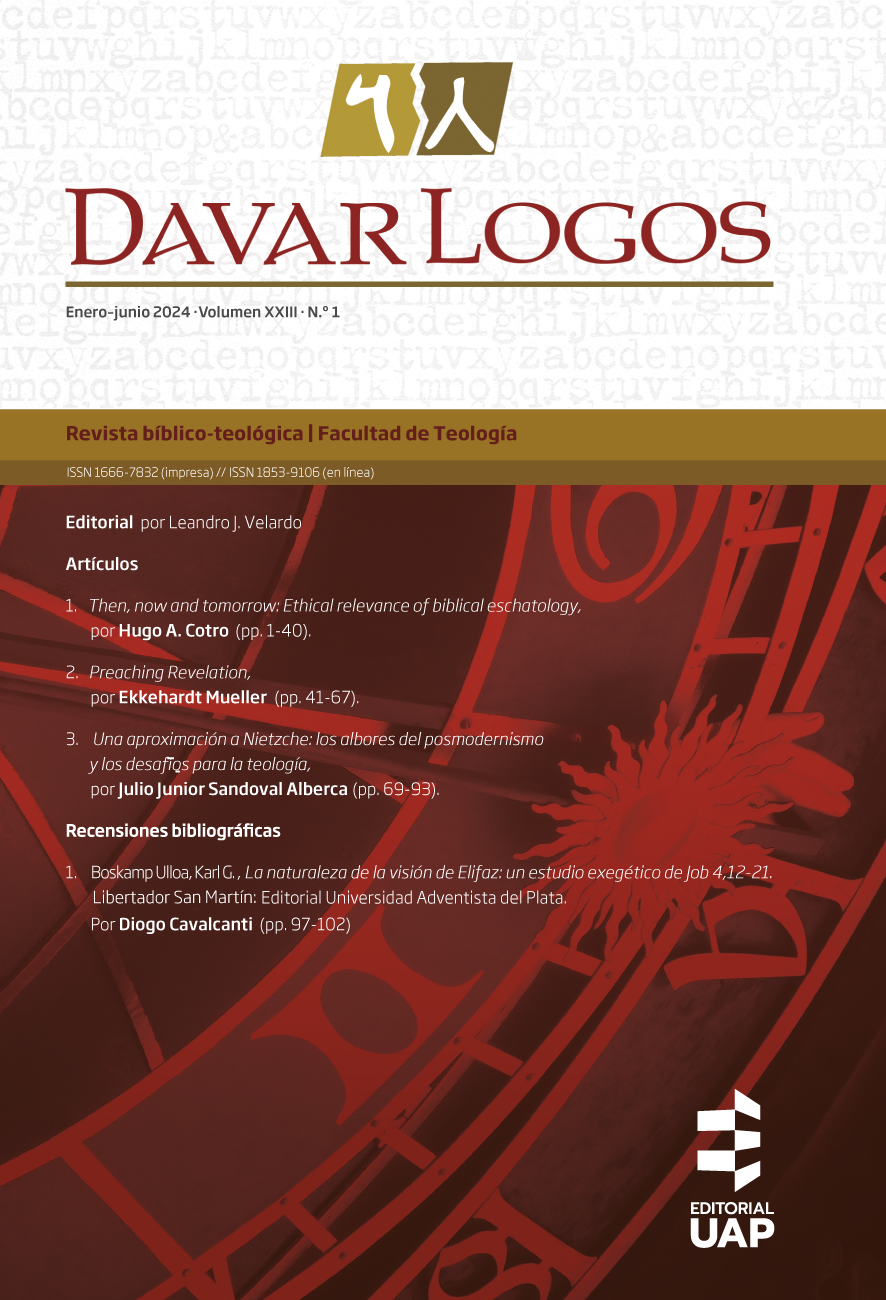Entonces, ahora y mañana: relevancia ética de la escatología bíblica
DOI:
https://doi.org/10.56487/dl.v23i1.1142Palabras clave:
Escatología – Ética – Revelación – ProfesíaResumen
La escatología bíblica es una moneda donde dos caras inextricables concurren e interactúan: las circunstancias contemporáneas del profeta y las previstas para el futuro reflejadas anticipadamente en las primeras. La relevancia ética y una mayordomía implícita del poder brillan en ambas como flujo perfecto que enlaza el pasado, el presente y el futuro, y subraya la opción ineludible ya sea por el bien o el mal dentro del escenario histórico universal del conflicto entre Dios y Satanás.
Descargas
Referencias
R. H. Charles, A critical and exegetical commentary on the Revelation of St. John (Edinburgh: T. & T. Clark, 1985), I: xv, xvi.
On this, see Victor Massuh, Sentido y fin de la historia en el pensamiento religioso actual (Buenos Aires: EUDEBA, 1963), especially chapter 7, where he comments on the thought of the German philosopher of history Josef Pieper: “La profecia es un modo de conocimiento no solo ligado al futuro. Esta entretejida en todo presente historico. Pueden percibirse los rasgos de la profecia en los hechos historicos actuales […] captar hondamente el sentido de las situaciones y figuras historicas del presente […] el Apocalipsis refleja la imagen de nuestro tiempo. Su espejo nos devuelve nuestra realidad” (90-91).
Felicisimo Martinez Diez y Benjamin Garcia F. La teología latinoamericana (Caracas: Ediciones Paulinas, 1989), 60-61; see also Caleb Rosado, What is God like? (Hagerstown: Review and Herald, 1990), 7-13.
Ibid., 70-71.
Ibid., 71.
Jorge Howard, Rivales del cristianismo (Buenos Aires: La Aurora), 109-111; Rosado, ibid., 15-22; see also John H. Yoder, The politics of Jesus (Grand Rapids, MI: Eerdmans, 1994). Perhaps an instance of this uncommitted spiritualization of Jesus’ message is the preference many have shown for the Matthean version—although not deeply rooted in exegesis—of the Blessings over the Lukan. “Blessed are the poor in spirit…” (Matt 5,3) is less disturbing and conflictive than “blessed be you, poor: for yours is the kingdom of God [...]. Blessed are you that hunger now, for you shall be filled. Blessed are you that weep now: for you shall laugh [...]. But woe unto you that are rich! For you have received your consolation. Woe unto you that are full! For you shall hunger. Woe unto you that laugh now! For you shall mourn and weep. Woe unto you, when all men shall speak well of you! For so did their fathers to the false prophets!” (Luke 6,20-26).
On this, see, for instance, Rosemary Radford Ruether, The radical kingdom: The Western experience of messianic hope, 1st ed. (New York: Harper & Row, 1970), 2-3.
Unless otherwise indicated, all the Bible quotations are from the New English Translation.
On the inherent critical and transforming potential of the Christian message for history and the social structures, see, for instance, Roy Branson, “Social reform as a sacrament of the Second Coming”, Spectrum 21, 3 (May 1991), 49-59.
See, for instance, Daniel 2,20.21; John 19,10.11; Acts 5,29; etc.
See Enrique Dussel, Ética comunitaria (Buenos Aires, AR: Ediciones Paulinas, 1986), especially 72, 73.
On this, see, for instance, Enrique Dussel, El humanismo semita (Buenos Aires: EUDEBA, 1969); El dualismo en la antropología de la cristiandad (Buenos Aires, AR: Editorial Guadalupe, 1974); Hans Walter Wolf, Antropologia do Antigo Testamento (Sao Paulo, BR: Edicoes Loyola, 1983), 2d. ed.; etc.
See Victor Codina, Ser cristiano en América Latina (Buenos Aires: Latinoamerica Libros S.R.L., 1986), 44-46.
F. Martinez Diez y B. Garcia F., ibid., 73-74, 76.
See Dussel, ibid., 21-24.
Letter to Diognetus 6,1. Text from Michael W. Holmes ed., The apostolic fathers (Grand Rapids, MI: Baker Books, 1999), 541.
Nazism, as other previous and subsequent totalitarian ideologies, managed to perceive and take advantage of this Christian split or dichotomization when it labeled as “State affairs” its genocidal policies, its pan-Germanist expansionism, etcetera. See in this respect, for instance, Tim Stafford, “Hitler and the failure of the church”, Signs of the Times, August 1991, 7-11.
Julio de Santa Ana, Protestantismo, cultura y sociedad (Buenos Aires: La Aurora, 1970), 98-100.
The Scriptures present themselves as a seamless chronicle of the struggle between good and evil, both incarnate in duets of opposed elements which confront each other in every historical epoch, environment and situation: God and Lucifer; Eve’s seed and the serpent’s offspring; Abel and Cain; etc., and by the paradigmatic manifestations of the institutionalized, corporative evil opposed to God’s people: Babel, Sodom, Egypt, Assyria, Babylon, Rome, etc. Interestingly, these historical incarnations of evil are typologically evoked in Revelation, the epitome of biblical eschatology, as symbolic prefigurations of the powers in which evil would be embodied in the final stage of the conflict (see Rev 11: Sodom and Egypt; Rev 16, 17 and 18: Babylon; Rev 2,18-22; 16: Achab and Jezabel; etc.).
Here it is an unmistakable and obvious identification between the devil and its political vehicles: Roman backed up local authorities and later on Rome itself—often instigated by some fringes of Judaism—in the first centuries. How would “the Devil” be able to do that (to imprison the faithful Christians), but making use of individual and corporative agents, by incarnating himself—so to say—in historically concrete instruments? That radically ethic identification has implications and derivations very disturbing to many: the stewardship of human power— be this political, military, economic, religious, or of any other nature—inevitably falls according to this scheme in one of two categories: either divine or devilish.
According to the American historicist theologian Frank Holbrook, in Understanding Revelation”, These Times ( July 1 1980): 32, the system commonly known as... historicist school of prophetic interpretation is based on the idea that prophecy pertains to the realm of time and, since prophecy is set up and expressed in a given historical situation, it will also find its fulfillment in the historical ongoing, which basically means a continuous and progressive fulfillment of the visions from the days of the prophet until the end of the present historical order.
See Charles Teel, “Growing up with John’s beasts: A rite of passage”, Spectrum, May 1991, 25-34.
In this respect, even some high-ranking ecclesiastical authorities—and much before the protestant reformation—saw in the medieval stage of the Roman church the fulfillment of the prophecies about the antichrist announced by Daniel, Paul, and John.
Ibid.
George Eldon Ladd, The Apocalypse of John: A commentary (Grand Rapids, MI: Eerdmans, 1972), 12-14.
Carlos Bazarra, ¿Qué es la teología...? (Buenos Aires, AR: Ediciones Paulinas, 1985), 27.
Ibid., 156.
See on this Klaus Scholder, The churches and the Third Reich (London, UK: SCM, 1988); Guenter Levi, La iglesia católica y la Alemania nazi (Mexico: Editorial Grijalbo, 1965); Rolf Hochhuth, El vicario (Mexico: Editorial Grijalbo, 1964), especially the historical-documentary appendix; Stafford, “Hitler and the failure of the Church”; etc. It is interesting the stereotyped answer of the religious organizations in general to the all-embracing and self-legitimated powers, an answer more predictable the greater the degree of institutionalization of those organizations, which makes them–by way of fear or of a self-preserving interest– proportionally more vulnerable to the propaganda and the pressure of those in power. That ecclesiastic compromise was the norm in Czarist Russia, in the subsequent communist stage, in Germany under the Nazism, in the socialist satellites of the Eastern Europe during the Cold War and during the right and left-wing dictatorships of Latin America, etcetera. Among the copious available literature on the issue, see, for instance, Sidney Reiners, “Catarama’s Romanian Ordeal: Where was the church?”, Spectrum, 18, 1 (October 1987), 26-31; Mark A. Kellner, “Europe: German, Austrian churches apologize for Holocaust actions”, Adventist News Network, August 15, 2005, accessed June 17 2024, https://adventist.news/news/europe-german-austrian-churches-apologize-for-holocaust-actions.
“Your gift may be in secret. And your Father, who sees in secret, will reward you” (Matt 6,4); “Do not accumulate for yourselves treasures on earth” (Matt 6,19); “Do not be afraid of those who kill the body but cannot kill the soul [psyjé: life]” (Matt 10,28); “You know that the rulers of the Gentiles lord it over them, and those in high positions use their authority over them […]. It must not be this way among you!” (Matt 20,25.26); “The Son of Man did not come to be served but to serve” (Matt 20,28); “It is more blessed to give than to receive” (Acts 20,35); “But you are not to be called ‘Rabbi’, for you have one Teacher and you are all brothers” (Matt 23,8); “The greatest among you will be your servant” (Matt 23,11); “And whoever exalts himself will be humbled, and whoever humbles himself will be exalted” (Matt 23,12); “All who take hold of the sword will die by the sword” (Matt 26,52); “My kingdom is not from this world” (John 18,36); etc. See also Richard Bauckham, The Bible in politics (Louisville, KY: John Knox Press, 1989), especially the chapter entitled “The political Christ”, 142-150; John H. Yoder, Jesus and his politics (Grand Rapids, MI: Eerdmans, 1972).
See, for instance, Duncan A. Reily, Momentos decisivos del metodismo (San Bernardo do Campo, BR: Imprenta Metodista, 1991).
Ibid.
Jonathan Butler, “Race relations in the church: The early radicalism” (part 1), Insight ( January 30, 1979): 7-8.
See, for instance, Jonathan Butler, “Speaking up”, Insight, June 12, 1979, 17-18; Charles Teel, Jr. “The radical roots of the Peruvian Adventism”, Spectrum, December 1990, 5-15; Idem, “Revolutionary missionaries in Peru: Fernando and Ana Stahl”, Spectrum, February 1988, 50-52.
Butler, “Race relations in the church” (part 1), 6.
Butler, ibid., 9.
Butler, ibid., 10.
John Brown (1800-1859) was an American deeply religious abolitionist who defended the emancipation of the slaves. He planned an uprising of the slaves in Virginia and the constitution of a free state south of the Appalachians. To that purpose, he assaulted with some companions a federal arsenal in 1859, but no slave dared to join them, and he had to surrender. He was judged for treason and executed.
Butler, ibid., 10.
An allusion to Revelation 18,13.
Cf. Genesis 4,10; James 5,4; Revelation 6,9.10.
In allusion to Revelation 14,8.9; 18,6 (italics supplied).
A clear allusion to Revelation 15, 16 and 20.
Ellen White, Spiritual Gifts (Washington, D.C.: Review and Herald, 1944), 1:191-193 (emphasis supplied).
Ellen White, Testimonies for the church (Mountain View, CA: Pacific Press, 1948), 1:264.
Butler, ibid., 12.
Quoted in Butler, ibid., 12.
Jo nathan Butler, “Race relations in the church: A segregated Adventism” (part 2), Insight, February 6, 1979, 7.
Alf Birch, Bailey Gillespie, Pat Habada, James Park, Monte Sahlin, and Jim Zackrison, So I send you: Biblical models of soul winning, Sabbath School Lessons, teacher’s edition, January-March 1994, 159.
Don Eckenroth, Ron Flowers, Bailey Gillespie, Brian Jones and Jim Zackrison, Three angels’ messages: Last call for heaven, Sabbath School Lessons, teacher’s edition, October-December 1994, 85 (The Great Controversy, 440, 441 is quoted).
Cf. Romans 2,14-16.
Albert Camus, L’incroyant et les chrétiens (Paris, FR: Pleiade, 1948); quoted in J. Feiner y L. Vischer, Nuevo libro de la fe cristiana (Barcelona, ES: Herder, 1977), 102, 103.
Waldemar Gurian, Hitler and the Christians (New York: Sheed and Ward, 1936), 162.
Martin Luther King Jr., “Remaining awake through a great revolution”, accessed on June 20, 2024, https://www.facebook.com/thekingcenter/videos/it-may-well-be-that-we-will-have-torepent-in-this-generation-not-merely-for-the/648455449232170/.
See Godfrey T. Anderson, The past is always present (Washington: Review and Herald, 1977), 12-13.
The absolutist dogma of the monarchy by God’s design had been sacralized by the European ecclesiastic hierarchy as a faithful reflect of the famous thought expressed by Louis XIV, “the sun king”, in his Memories: “Todo lo que se encuentra en la extension de nuestros Estados, de cualquier naturaleza que sea, nos pertenece [a los reyes]. La voluntad de Dios es que cualquiera que haya nacido subdito obedezca ciegamente [...]. Por muy nefasto que pueda ser un principe, la rebelion de sus subditos es siempre criminal” (quoted in Alfonso Lazo, Revoluciones del mundo moderno [Barcelona: Salvat, 1984], 7). In other words, no one was in power unless by God’s will. Therefore, the ruler was accountable for his actions to God alone.
See, for instance, Clifford Goldstein, “Anti-Semites and the City of God”, Liberty, ( January-February 1985), 24-25; M. A. Zaburov, Historia de las cruzadas (Buenos Aires: Editorial Futuro, 1960), especially 11-31; Friedrich Nietzsche, Así habló Zaratustra (Barcelona: Planeta, 1992); Hans Kung. .Existe Dios?, 2nd. ed. (Madrid: Cristiandad, 1979), 554-559; Juan Carlos Garcia-Borron, prologue to Así habló Zarathustra (Barcelona: Hyspamerica, 1974), 23-25; Horacio Lona, Fe cristiana y realidad social: estudios sobre el cristianismo antiguo (Buenos Aires: Centro Salesiano de Estudios, 1992), 12; etc.
Victor Massuh, La libertad y la violencia (Buenos Aires: Editorial Sudamericana, 1968), 119, 120, 122.
Victor Massuh, Nihilismo y experiencia extrema (Buenos Aires: Editorial Sudamericana, 1975), 87.
Massuh, La libertad y la violencia, 121, 122.
Massuh, ibid., 88.
de Santa Ana, Protestantismo, cultura y sociedad, 106, 107.
Descargas
Publicado
Número
Sección
Licencia
Derechos de autor 2024 DavarLogos

Esta obra está bajo una licencia internacional Creative Commons Atribución-NoComercial-CompartirIgual 4.0.





